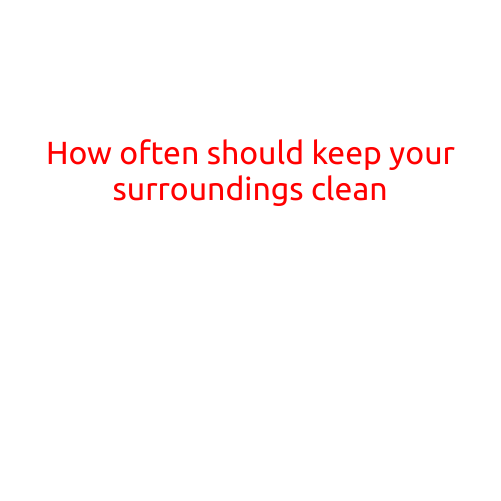
How Often Should You Keep Your Surroundings Clean?
Maintaining a clean and organized living space is essential for both physical and mental well-being. However, it’s difficult to determine exactly how often you should clean your surroundings. In this article, we’ll explore the importance of cleaning, the different types of cleanliness, and provide some general guidelines on how often you should keep your surroundings clean.
Why is cleaning important?
Cleaning is essential for several reasons:
- Health and Hygiene: Cleaning helps prevent the spread of diseases and keeps your environment free from germs and bacteria.
- Allergy and Asthma Relief: Regular cleaning can reduce exposure to allergens and irritants, providing relief for those with allergies and asthma.
- Mental Well-being: A clean and organized living space can improve mental clarity, reduce stress, and boost mood.
- Environmental Sustainability: By reducing waste and conserving resources, cleaning also contributes to a more sustainable environment.
Types of cleanliness
There are different levels of cleaning that are necessary depending on the surface or area. These include:
- Daily Cleaning: Quick tidy-ups and surface cleaning to maintain a sense of order and hygiene. Examples include wiping down kitchen counters, sweeping the floor, and making your bed.
- Weekly Cleaning: Deeper cleaning tasks that require more time and effort. Examples include cleaning the bathrooms, mopping the floors, and dusting furniture.
- Bi-Weekly Cleaning: Tasks that require less frequent attention, such as cleaning the oven, refrigerator, and windows.
- Deep Cleaning: Intensive cleaning sessions to tackle tough tasks like cleaning out the garage, sorting through cluttered closets, or repainting walls.
How often should you clean?
The frequency of cleaning depends on various factors, including:
- Personal Preferences: Some people prefer a tidy environment and may clean more frequently, while others may be more relaxed about cleaning.
- Size of the Living Space: Larger spaces naturally require more frequent cleaning to maintain a sense of order.
- Number of People Living in the Space: More people living in a space can mean more mess and dirt, requiring more frequent cleaning.
- Pets and Allergies: If you have pets or allergies, you may need to clean more frequently to remove pet hair, dander, and allergens.
Here are some general guidelines:
- Daily: Spend 10-15 minutes per day on daily cleaning tasks.
- Weekly: Set aside 1-2 hours on Sundays or Mondays for weekly cleaning tasks.
- Bi-Weekly: Allocate 30 minutes to 1 hour every other week for bi-weekly cleaning tasks.
- Deep Cleaning: Schedule 2-4 hours every 2-4 weeks for deep cleaning tasks.
Tips for maintaining a clean environment
- Create a cleaning schedule: Plan out your cleaning tasks and schedule them to ensure consistency.
- Break tasks into smaller chunks: Divide larger tasks into smaller, manageable tasks to make cleaning less overwhelming.
- Use cleaning products and tools that work best for you: Experiment with different products and tools to find what works best for your cleaning needs and preferences.
- Don’t forget the little things: Pay attention to details like cleaning light switches, doorknobs, and remotes to maintain a truly clean and hygienic environment.
Conclusion:
Cleaning is an essential part of maintaining a healthy, happy, and organized living space. By understanding the different types of cleanliness and creating a cleaning schedule, you can keep your surroundings clean and tidy. Remember to adjust your cleaning frequency based on your personal preferences, the size of your living space, and other factors. By incorporating these tips into your routine, you’ll be well on your way to a cleaner, healthier, and more sustainable living environment.





